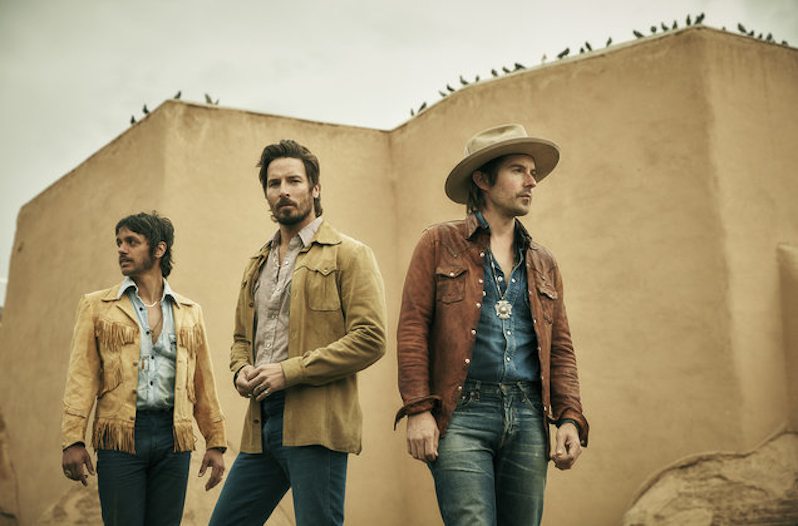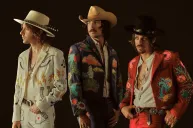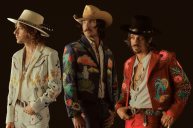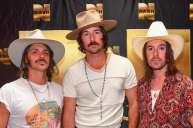[dropcap]C[/dropcap]ountry fans demand authenticity from their artists. It's just part of the package. While pop stars can invent and reinvent themselves ad nauseam, in the world of country, there's not a lot of room for reinvention. Instead, country listeners seek out the authentic country artist, one with a background we can relate to. We long for a story that sounds like it should be written in three-four time. There's a reason why David Bowie was able to transform into Ziggy Stardust and Garth Brooks is still fielding Chris Gaines jokes. (And the ill-advised soul patch is only part of it.)
Videos by Wide Open Country
Recently, the authenticity of burgeoning country band Midland was called into question on the popular country music website Saving Country Music. The band, which is signed to Nashville's Big Machine Records, is currently climbing the country charts with the single "Drinkin' Problem." The article charges that Midland's portrayal as a hardscrabble Texas country band is false. It claims that the band's image is actually a carefully-calculated manipulation on the part of Big Machine. What followed was a barrage of comments from folks either defending the band's country roots or calling them gimmicky, fake and "what Californians think Texans look like."
Let's be clear: Midland is an incredibly talented band. Their songs are smartly crafted and hit the sweet spot between Gary Stewart and George Strait. Wide Open Country even named them as a band to watch before their debut self-titled EP dropped last year.
Sure, they look like they were ripped from a catalog. And it does seem a little suspect that Big Machine was so eager to sign a band formed in 2013 at a wedding in Jackson Hole, Wyoming and market them as a long-suffering Texas band. But Midland also makes great country music and clearly have a deep and abiding love for the genre. (They list John Conlee, Keith Whitley and Gary Stewart as main influences.)
This isn't about taking Midland to task for not being "country enough" or faking it. Though their time in the Texas music scene does seem to be exaggerated, the men of Midland all have strong ties to the West. And whether you're from Texas, Brooklyn or Mars, good country music is good country music. But it raises the question: how much does having an "authentic" country background matter today? And should it matter at all?
The "Dirt Farms" Factor
In his book Creating Country Music Richard Peterson writes about legendary country talent scout and producer Ralph Peer. Above all, Peer sought authenticity and original material when observing artists. Over time, Peterson writes, the idea of authenticity began to border on cliche.
From the book:
"A 1952 American Magazine on the 'Grand Ole Opry' titled 'Hillbilly Heaven,' for example, notes that 'the show retains an authentic backwoods flavor because it has neither phonies nor fakers' and goes on to say that while all of the big acts are too busy touring to work on a farm, 'everyone one of them owns a dirt farm and personally oversees it.'"
So why is the industry so concerned with downhome authenticity? It's due in part to the genre's formation during the Great Depression. The Carter Family, among the first true country music stars, rose to prominence in the late 1920s and '30s. They sang about simple living and hardships in songs such as "No Depression in Heaven."
The following generations of country stars either had first-hand experience with the Great Depression or parents who lived through it. Living a simple life was to live with honor. Dolly Parton and Loretta Lynn, for example, proudly sang of their humble beginnings.
Fake Authenticity and Dirt Roads
Today, country music is still the most traditionally-minded format of popular music. As a result, country fans have little patience for forced "authenticity," such as artists who love to sing about how much they love dirt roads and spending time on tractors. How many rural Americans do you know that have that much time to spend cruising around dirt roads?
The song "I'll Sing About Mine," written by Adam Hood and Brian Keene and popularized by the Josh Abbott Band, addressed pop-country falsities.
Perhaps that's why so many traditional country fans support the grassroots efforts of Margo Price and Cody Jinks, who spend nearly a decade steadily building a fan base, and the don't-give-a-damn-what-you-think attitude of Sturgill Simpson, whose prickly relationship with Nashville has only raised his profile as an industry outsider worth rooting for. Their music rings true because it was hard-won, built from late nights in bars and weeks on the road.
The Stapleton Effect
Giving a band like Midland a chance to shine is certainly a win for fans of substantive country music. Their social media pages are filled with comments from folks praising them for making traditional country. They have people excited about the future of country music and that shouldn't be taken lightly.
We shouldn't be such hardasses that can't enjoy artists because they don't appear to live up to a rigid country music background pedigree. But we should also hold record labels accountable. Big Machine clearly saw dollar signs from the "Chris Stapleton effect" and started looking for the next marketable traditional act.
If Midland can get Music Row support with their brand of stripped-down, harmony-laden country, why not a band like Turnpike Troubadours, who've spent years playing every dive bar in Texas and beyond? Or Ashley Monroe, Angaleena Presley, and the dozens of independent women country artists who've paid their dues time and again?
It's time for Nashville labels to start recognizing more artists like Midland. The success of "Drinkin' Problem" is proof that listeners are hungry for more traditional country. We have plenty of proof that it's still marketable.



